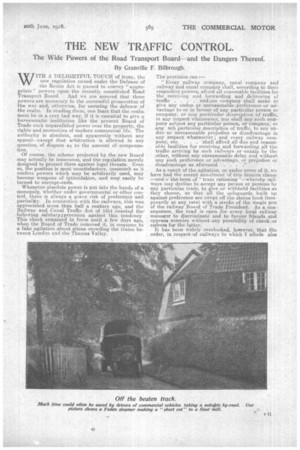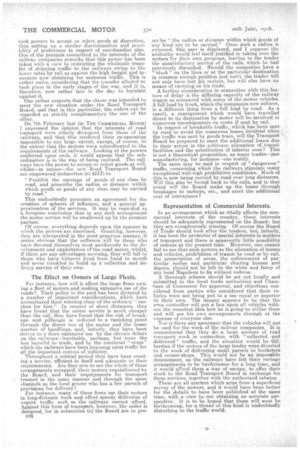THE NEW TRAFFIC CONTROL.
Page 17

Page 18

If you've noticed an error in this article please click here to report it so we can fix it.
The Wide Powers of the Road Transport Board—and the Dangers Thereof. By Granville F. Bilbrough.
WITH A DELIGHTFUL TOUCH of irony, the new regulation issued under the Defence of the Realm Act is passed to convey "appropriate" powers upon the recently constituted Road Transport Board. And we are assured that these powers are necessary to the successful prosecution of the war and, otherwise, for securing the defence of the realm. In reading them, one fears that the realm must be in a very bad way, if it is essential to give a bureaucratic institution like the present Board of Trade such unparalleled power over the property, the rights and necessities of modern commercial life. The authority is absolute, and apparently 'without any appeal—except that arbitration is allowed in any question, of dispute as to the amount of :compensa
tion. .
Of course, the scheme projected by the new Board may actually be innocuous, and the regulation merely designed to protect them against legal threats. Even so, the position is most unsatisfactory, inasmuch ELS it confers powers which may be -arbitrarily used, may become weapons of intimidation, and may easily be turned to corrupt.ends.
.Whenever absolute power is put into the hands of a. monopoly, whether under governmental or other control, there is always a grave risk of preference and partiality. In connection. with the railways, this was. appreciated more than half a century ago, and the Railway and Canal Traffic Act of 1854 enacted the • following salutary4provision against this tendency This cheek remained in force until a few days ago, when the Board of Trade removed it, in response to a fake agitation about aliens crowding the trains between London and the Thames Valley. The provision ran Every railway company, canal company and railway and canal company shall, according to their respective powers, afford all reasonable facilities for the _receiving and forwarding and delivering of traffic . . . . andAno compliny shall make or give any undue or unreasonable preferenceor advantage to or in favour of any particular person or company, or any particular description of traffic, in any respect whatsoever, nor shall any such company subject any particular person, or company, or any uch particular description of traffic, to any undue or unreasonable prejudice or disadvantage in any respect whatsoever ; • and every railway company, etc. . . . shall afford all due and reasonable facilities for receiving and forwarding all the traffic arriving by such railways or -canals by the ,other, without any unreasonable delay and without any such preference or .advantage, or prejudice or disadvantage as aforesaid As a result Of the agitation, or under cover of it, we have had the recent annulment 'of this famous clause —und r the-terrn of "train rationing "—whereby railways may decline to accept any person or persons by any particular train to give or withhold facilities as they choose, so that all the safeguards built up against preference are swept off the statue book (temporarily at any rate) with a stroke of the magic pen of the railway Board of Trade President. As a consequence, theroad is open for every local railway manager to discriminate and to favour friends and oppress enemies without any possibility of check,.or redress foa. the latter. .
It has been widely overlooked, however, that the order, in respect -of railways to which I allude also took powers to accept or reject goods at discretion, thus setting up a sindlar discrimination and puedbility of preference in respect of merchandise also. One of the journals committed to the interests of the railway companies remarks that this power has been taken with a view to restricting the wholesale transfer of shipping traffic to the railways owing ta the lower rates by rail as against the high freight and insurance now obtaining for seaborne traffic. This is rather naive, considering that the transfer 'alluded to took place in the early stages of the war, and it is, therefore, now rather late in the day to legislate against it. One rather suspects that the clause was intended to meet the new situation under the Road Transport Board, and that in this particular, the orders can be regarded as strictly complementary the one of the °Men
On 7th February last (in THE COMMERCIAL MOTOR) I expressed the opinion that the interests of road transport were utterly divergent from those of the railways, and that this rendered their co-operation . impossible to any large extent, except, of course, to the extent that the motors were subordinated to the requirements of the railways. Looking at the powers conferred upon each, it would appear that the subordination is in the way of being realized. The railways have the power -to accept or reject goods art will, whilst—in unison—the new Road Transport Board are empowered (subsection (e) 2.1-JJ) to
" Prohibit the carriage of goods of any class by road, and prescribe the radius or distance within which goods or goods of any class may be carried by road."
This undoubtedly presumes an agreement for the creation of spheres of influence, and' a general approximation of the services. It may be regarded as a foregone conclusion that in any such arrangement the motor service will be swallowed up by the premier partner. Of course, everything depends upon the manner in which the powers are exercised. Granting, however, they are interpreted in the most generous manner, it seems obvious that the sufferers will be those who have devoted themselves most assiduously to the development and exploitation of the road motor, whilst, if there are any advantages accruing, they. will fall to those who have hitherto lived from hand to mouth and never troubled to build up a collection and delivery service of their own.
The Effect on Owners of Large Fleets.
For instance, how will it affect the large firms owning a fleet of motors and making extensive use of the roads? Their policy in the past has been dictated by a, number of important considerations, which have necessitated their winning clear of the ordinary "carriers for hire." In respect of short distances, they have found that the motor service is much cheaper than the rail, they have found that the risk of breakage and pilferage is reduced to a vanishing point through the direct run of the motor and the lesser number of handlings, and, latterly, they have been driven to a more extensive use by the chronic delays on the railways—inevitable, perhaps, but none the less harmful to trade, and by the continual " stops " which the railways have been imposing upon traffic for all the important centres of industry.
Throughout a. critical period they have been creating a service, efficient in itself and adequate to their requirements. Are they now to see the whole of these arrangements scrapped, their motors requisitioned by the Board, and their requirements for transport treated in the same manner and through the same channels as the local grocer who has a few parcels of provisions for delivery? For instance, many of these firms use their motors in long-distance work and effect speedy deliveries of urgent traffic such as the railways cannot afford. Against this form of transport, however, the order is designed; for in subsection (e) the Board are to pre 042
scr:be "the radius or distance within which -goods of any kind are to be carried." Once such a radius is enforced, this user is displaced, and I suppose the authority would feel itself justified in taking over the motars for their own purposes, leaving to the trader the unsatisfactory service of the rails, which he had previously discarded. Should the companies have a "block" on the lines or at the particular destination (a common enough position just now), the trader will not only have lost his motors, but will also have no means of carrying on his trade. A further consideration in connection with this feature of delay is the differing capacity of the railway -wagon as compared with. many of the motor vehicles. A full load by truck, which the companies now enforce, is a different thing from a full load by road. As a result, a consignment which would have travelled direct to its destination by motor will be involved in numerous transhipments en route if sent by rail. In respect of breakable traffic, which has been sent by road to avoid the numerous losses involved when the traffic was sent by goods train, will the Transport Board be prepared to meet the additional losses due to their action in the arbitrary alienation ofetransit facilities and the substitution of inferior ones ? This is not a theoretical proposition, as many trades—jam manufacturing, for instance—can testify.
The same may be said in respect of "dangerous" traffic, concerning which the railways stipulate many exceptional well-nigh prohibitive conditions. Much of this is now being carried by road over long distances. Will this also be forced back to the rails, and in that event will the Board make up the losses through breakages to carboys, etc., and meet the additional cost of conveyance ?
Representation of Commercial Interests.
In an arrangement which so vitally affects the commercial interests of the country, these interests should he adequately represented on the Board: but they are conspicuously missing. Of course the Board of Trade should look after the traders, but, latterly, it has been the protector of special interests in matters of transport arid there is apparently little possibility of redress at the present time. However, one cannot fail to see that suoh powers as the alienation of horses and vehicles, prohibition of transit by road or by rail, the prescription of areas, the enforcement of particular routes and particular clearing houses and depots, should not be left to the whim and fancy of any local Napoleon to fix without redress.
A thorough scheme should be set out locally and submitted to the local trade authorities and Chem:leers of Commerce for approval, and objections considered from parties who considered that their vehicles were not being put to a use equal or superior to their own. The danger appears to be that the area controller' will put a lien upon all vehicles without the remotest idea how he is going to utilize them and will see his own arrangements through at the expense of everyone else.
Nor is there any assurance that the vehicles will not be used for the work of the railway companies. It is remenibered that they do a large amount of road transport work in connection with "collected and delivered" traffic, and the situation would be Gilbertian if the motors of the large trader were diverted -to the work of delivering small parcels to hucksters and corner-shops. This would not be an impossible denouement, as the railways have felt their cartage arrangements to -be burdensome for a long time, and it would afford them a way of escape, to offer their stock to the Road Transport Board in exchange for these services, together with the authorized rebates.
These are all matters which arise from a, superficial survey of the powers, and it would have been better for the details to have been published at the same time, with a view to our obtaining an accurate perspective. It is to be hoped that these will .soon be forthcoming, for a threat of this kind is undoubtedly disturbing to the traffic world;






















